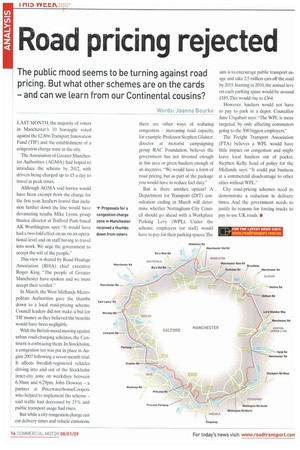Road pricing rejected
Page 16

If you've noticed an error in this article please click here to report it so we can fix it.
The public mood seems to be turning against road pricing. But what other schemes are on the cards and can we learn from our Continental cousins?
Words: Joanna Bourke LAST MONTH, the majority of voters in Manchester's 10 boroughs voted against the £2.8bn Transport Innovation Fund (TIF) and the establishment of a congestion charge zone in the city.
The Association of Greater Manchester Authorities (AGMA) had hoped to introduce the scheme by 2012, with drivers being charged up to 15 a day to travel at peak times.
Although AGMA said lorries would have been exempt from the charge for the first year, hauliers feared that inclusion further down the line would have devastating results. Mike Lyons, group finance director at Trafford Park-based AK Worthington. says: "It would have had a two-fold effect on us; on an operational level and on staff having to travel into work. We urge the government to accept the will of the people."
This view is shared by Road Haulage Association (RHA) chief executive Roger King. "The people of Greater Manchester have spoken and we must accept their verdict" In March, the West Midlands Metropolitan Authorities gave the thumbs down to a local road-pricing scheme. Council leaders did not make a bid for TIF money as they believed the benefits would have been negligible.
With the British mood moving against urban road-charging schemes, the Continent is embracing them. In Stockholm, a congestion tax was put in place in August 2007 following a seven-month trial. It affects Swedish-registered vehicles driving into and out of the Stockholm inner-city zone on weekdays between 6.30am and 6.29pm. John Dowson a partner at PricewaterhouseCoopers who helped to implement the scheme said traffic had decreased by 25% and public transport usage had risen.
But while a city congestion charge can cut delivery times and vehicle emissions, there are other ways of reducing congestion increasing road capacity, for example. Professor Stephen Glaister, director at motorist campaigning group RAC Foundation, believes the government has not invested enough in this area or given hauliers enough of an incentive. -We would have a form of road pricing, but as part of the package you would have to reduce fuel duty."
But is there another option? A Department for Transport (DfT) consultation ending in March will determine whether Nottingham City Council should go ahead with a Workplace Parking Levy (WPL). Under the scheme, employers (or staff) would have to pay for their parking spaces. The aim is to encourage public transport usage and take 25 million cars off the road by 2015. Starting in 2010, the annual levy on each parking space would be around £185.This would rise to £364.
However, hauliers would not have to pay to park in a depot. Councillor Jane Urquhart says: "The WPL is more targeted, by only affecting commuters going to the 500 biggest employers."
The Freight Transport Association (FTA) believes a WPL would have little impact on congestion and might leave local hauliers out of pocket. Stephen Kelly. head of policy for the Midlands. says: "It could put business at a commercial disadvantage to other cities without WPL."
City road-pricing schemes need to demonstrate a reduction in delivery times. And the government needs to justify its reasons for forcing trucks to pay to use UK roads. •








































































































































